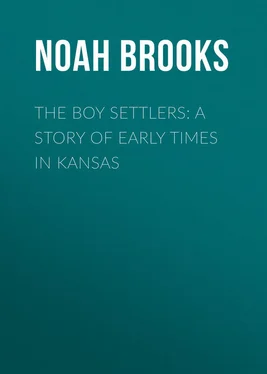Noah Brooks - The Boy Settlers - A Story of Early Times in Kansas
Здесь есть возможность читать онлайн «Noah Brooks - The Boy Settlers - A Story of Early Times in Kansas» — ознакомительный отрывок электронной книги совершенно бесплатно, а после прочтения отрывка купить полную версию. В некоторых случаях можно слушать аудио, скачать через торрент в формате fb2 и присутствует краткое содержание. Жанр: foreign_antique, foreign_prose, foreign_children, на английском языке. Описание произведения, (предисловие) а так же отзывы посетителей доступны на портале библиотеки ЛибКат.
- Название:The Boy Settlers: A Story of Early Times in Kansas
- Автор:
- Жанр:
- Год:неизвестен
- ISBN:нет данных
- Рейтинг книги:5 / 5. Голосов: 1
-
Избранное:Добавить в избранное
- Отзывы:
-
Ваша оценка:
- 100
- 1
- 2
- 3
- 4
- 5
The Boy Settlers: A Story of Early Times in Kansas: краткое содержание, описание и аннотация
Предлагаем к чтению аннотацию, описание, краткое содержание или предисловие (зависит от того, что написал сам автор книги «The Boy Settlers: A Story of Early Times in Kansas»). Если вы не нашли необходимую информацию о книге — напишите в комментариях, мы постараемся отыскать её.
The Boy Settlers: A Story of Early Times in Kansas — читать онлайн ознакомительный отрывок
Ниже представлен текст книги, разбитый по страницам. Система сохранения места последней прочитанной страницы, позволяет с удобством читать онлайн бесплатно книгу «The Boy Settlers: A Story of Early Times in Kansas», без необходимости каждый раз заново искать на чём Вы остановились. Поставьте закладку, и сможете в любой момент перейти на страницу, на которой закончили чтение.
Интервал:
Закладка:
“Just think of it, Oscar, we might have some real Indian-fighting out there, like that Father Dixon and the rest of the old settlers had in the time of the Black Hawk war.”
His father assured him, however, that there was no longer any danger from the red man in Kansas. The wild Indians were now far out on the frontier, beyond the region to which emigrants would probably go in search of homestead lands for settlement. Sandy looked relieved at this explanation. He was not anxious for fighting with anybody. Fun was more to his liking.
The two mothers, when they were informed of the decision of the male members of the family, made very little opposition to the emigration scheme. In fact, Mrs. Howell had really felt for some time past that her boys would be better provided for in a new country. She had been one of the “old settlers” of Dixon, having been brought out from the interior of New York when she and her brother were small children. She had the same spirit of adventure that he had, and, although she remembered very well the privations and the discomforts of those early days, it was more with amusement than sorrow that she recalled them to mind, now that they were among the traditions of long-past years. The two young Howells were never weary of hearing their mother tell of the time when she killed a wildcat with her father’s rifle, or of her walking fifteen miles and back to buy herself a bonnet-ribbon to wear to her first ball in the court-house. Now her silent influence made it easier for the Kansas Exodus (as they already called their scheme) to be accepted all around.
The determination of the two families to migrate made some stir in the town. It was yet a small place, and everybody knew every other body’s business. The Bryants and Howells were among the “old families,” and their momentous step created a little ripple of excitement among their friends and acquaintances. The boys enjoyed the talk and the gossip that arose around them, and already considered themselves heroes in a small way. With envious eyes and eager faces, their comrades surrounded them, wherever they went, asking questions about their outfit, their plans, and their future movements. Every boy in Dixon looked on the three prospective boy settlers as the most fortunate of all their young playfellows.
“I wish my father would catch the ‘Kansas fever,’” said Hiram Fender, excitedly. “Don’t you suppose your father could give it to him, Charlie? Do you suppose your uncle would take me along if Dad would let me go? Oh, wouldn’t that be just gaudy, if I could go! Then there would be four of us boys. Try it on him.”
But the two families resolutely attended to their own business, asking help from nobody, and not even so much as hinting to anybody that it would be a good thing for others to go with them to the Promised Land. The three boys were speedily in the midst of preparations for their migration. It was now well along in the middle of May. If they were to take up land claims in Kansas and get in a crop, they had no time to spare. The delightful excitement of packing, of buying arms and ammunition, and of winding up all the small concerns of their life in Dixon made the days pass swiftly by. There were all the details of tents for camping-out, provisions for the march, and rough clothing and walking gear for the new life beyond to be looked after.
Some of the notions of the boys, in regard to what was needed and what was to be expected from the land beyond, were rather crude. And perhaps their fathers were not in all cases so wise as they thought themselves. The boys, however, cherished the idea that absolutely everything they should require in Kansas must be carried from Illinois. “Why,” said the practical Mr. Howell, “if we cannot buy ploughs, cattle, and seed, cheaper in Missouri than we can here, we can at least save the labor and cost of transportation. We don’t want to haul a year’s provisions, either. We expect to raise something to eat, don’t we?”
Charlie, to whom this remonstrance was addressed, replied, “Well, of course we can raise some garden truck, and I suppose we can buy bacon and flour cheaper in Missouri than here.”
“Then there’s the game,” interrupted Oscar and Sandy, both in one breath. “Governor Robinson’s book says that the country is swarming with game,” added Sandy, excitedly.
The boys had devoured a little book by Mr. Robinson, the free-State Governor of Kansas, in which the richness of the Promised Land was glowingly set forth.
“Much time we shall have to shoot buffaloes and antelope when we are breaking up the sod and planting corn,” Mr. Howell answered with a shade of sarcasm in his voice.
“And we may have to fire at bigger game than either of those,” added Mr. Bryant, grimly.
“Border Ruffians?” asked Sandy, with a feeble attempt at a grin. His mother shuddered and hastily went out of the room. The Kansas scheme seemed no longer pleasant to her, when she read the dreadful stories of violence and bloodshed with which some of the Western newspapers were teeming. But it was settled that most of the tools needed for farming could be bought better in Missouri than in Illinois; the long haul would be saved, and the horses with which they were to start could be exchanged for oxen to good advantage when they reached “the river.” They had already adopted the common phrase, “the river,” for the Missouri River, then generally used by people emigrating westward.
“But perhaps the Missourians will not sell you anything when they know that you are free-State men,” suggested Mrs. Bryant, timidly, for this was a family council.
“Oh, well,” answered Mr. Howell, sturdily, “I’ll risk that. I never saw a man yet with anything to sell who wouldn’t sell it when the money was shaken in his face. The newspapers paint those border men pretty black, I know; but if they stop to ask a man’s politics before they make a bargain with him, they must be queer cattle. They are more than human or less than human, not Americans at all, if they do business in that way.” In the end they found that Mr. Howell was entirely right.
All was settled at last, and that, too, in some haste, for the season was rapidly advancing when planting must be attended to, if they were to plant that year for the fall harvest. From the West they heard reports of hosts of people pouring into the new Territory, of land being in great demand, and of the best claims near the Missouri being taken by early emigrants. They must be in a hurry if they were to get a fair chance with the rest and a fair start on their farm,–a farm yet existing only in their imagination.
Their wagon, well stored with clothing and provisions, a few books, Oscar’s violin, a medicine chest, powder, shot, and rifle-balls, and an assortment of odds and ends,–the wagon, so long a magical repository of hopes and the most delightful anticipations, was ready at last. It stood at the side gate of Mr. Bryant’s home, with a “spike team” (two horses at the pole, and one horse for a leader) harnessed. It was a serious, almost solemn, moment. Now that the final parting had come, the wrench with which the two families were to be broken up seemed harder than any of the members had expected. The two mothers, bravely keeping up smiling faces, went about the final touches of preparations for the lads’ departure and the long journey of their husbands.
Mr. Howell mounted the wagon with Sandy by his side; Mr. Bryant took his seat with the other two boys in an open buggy, which they were to drive to “the river” and there trade for a part of their outfit. Fond and tearful kisses had been exchanged and farewells spoken. They drove off into the West. The two women stood at the gate, gazing after them with tear-dimmed eyes as long as they were in sight; and when the little train disappeared behind the first swale of the prairie, they burst into tears and went into the house which was now left unto them desolate.
Читать дальшеИнтервал:
Закладка:
Похожие книги на «The Boy Settlers: A Story of Early Times in Kansas»
Представляем Вашему вниманию похожие книги на «The Boy Settlers: A Story of Early Times in Kansas» списком для выбора. Мы отобрали схожую по названию и смыслу литературу в надежде предоставить читателям больше вариантов отыскать новые, интересные, ещё непрочитанные произведения.
Обсуждение, отзывы о книге «The Boy Settlers: A Story of Early Times in Kansas» и просто собственные мнения читателей. Оставьте ваши комментарии, напишите, что Вы думаете о произведении, его смысле или главных героях. Укажите что конкретно понравилось, а что нет, и почему Вы так считаете.












